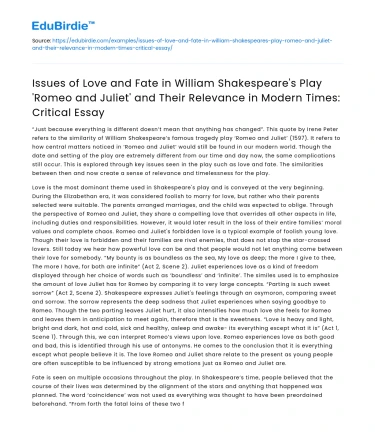“Just because everything is different doesn’t mean that anything has changed”. This quote by Irene Peter refers to the similarity of William Shakespeare’s famous tragedy play ‘Romeo and Juliet’ (1597). It refers to how central matters noticed in ‘Romeo and Juliet’ would still be found in our modern world. Though the date and setting of the play are extremely different from our time and day now, the same complications still occur. This is explored through key issues seen in the play such as love and fate. The similarities between then and now create a sense of relevance and timelessness for the play.
Love is the most dominant theme used in Shakespeare's play and is conveyed at the very beginning. During the Elizabethan era, it was considered foolish to marry for love, but rather who their parents selected were suitable. The parents arranged marriages, and the child was expected to oblige. Through the perspective of Romeo and Juliet, they share a compelling love that overrides all other aspects in life, including duties and responsibilities. However, it would later result in the loss of their entire families’ moral values and complete chaos. Romeo and Juliet's forbidden love is a typical example of foolish young love. Though their love is forbidden and their families are rival enemies, that does not stop the star-crossed lovers. Still today we hear how powerful love can be and that people would not let anything come between their love for somebody. “My bounty is as boundless as the sea, My love as deep; the more I give to thee, The more I have, for both are infinite” (Act 2, Scene 2). Juliet experiences love as a kind of freedom displayed through her choice of words such as ‘boundless’ and ‘infinite’. The similes used is to emphasize the amount of love Juliet has for Romeo by comparing it to very large concepts. “Parting is such sweet sorrow” (Act 2, Scene 2). Shakespeare expresses Juliet's feelings through an oxymoron, comparing sweet and sorrow. The sorrow represents the deep sadness that Juliet experiences when saying goodbye to Romeo. Though the two parting leaves Juliet hurt, it also intensifies how much love she feels for Romeo and leaves them in anticipation to meet again, therefore that is the sweetness. “Love is heavy and light, bright and dark, hot and cold, sick and healthy, asleep and awake- its everything except what it is” (Act 1, Scene 1). Through this, we can interpret Romeo’s views upon love. Romeo experiences love as both good and bad, this is identified through his use of antonyms. He comes to the conclusion that it is everything except what people believe it is. The love Romeo and Juliet share relate to the present as young people are often susceptible to be influenced by strong emotions just as Romeo and Juliet are.
Fate is seen on multiple occasions throughout the play. In Shakespeare’s time, people believed that the course of their lives was determined by the alignment of the stars and anything that happened was planned. The word ‘coincidence’ was not used as everything was thought to have been preordained beforehand. “From forth the fatal loins of these two foes, A pair of star-crossed lovers take their life” (Prologue). Immediately from the prologue, we learn of Juliet and Romeo’s ill-fated destiny through the use of foreshadowing and celestial imagery. It is through circumstance that leads Juliet and Romeo to their destined fate. By chance, Benvolio and Romeo meet the same day as the Capulet’s house party and discuss love. If Benvolio had not convinced Romeo to attend the Capulet’s party, he never would have met Juliet. The scene before Romeo enters the Capulet’s house party, he has a premonition that would result in tragedy and his death. “I fear too early, for my mind misgives; Some consequence, yet hanging in the stars Shall bitterly begin” (Act 1, Scene 4). Ironically, Romeo foreshadows his fate when he states that the consequence of his decision to attend is hanging in the stars, he reminds the viewer of the tragic fate that lays ahead of him. Shakespeare uses the recurring reference of the stars to correspond with one's fate, fortune and destiny. After Romeo learns of Juliet’s death, he cries out: “Then I defy you, stars” (Act 5, Scene 1). In saying this, Romeo is declaring he denies fate and will test upon his own free will. Dramatic irony is used here since Romeo attempts to test fate, but instead actually ends up fulfilling it. For Romeo life without Juliet is a cruel fate. Romeo’s suicide provokes Juliet to kill herself because she cannot stand to live a life without Romeo. Untimely their tragic fate is attained. In modern society, fate does not apply to all aspects of life as fate is questioned by freewill. What would have been called fate or in the stars during the Elizabethan era would now be referred to as a mere coincidence or accident. Though society’s views upon fate may have differentiated from the past, that does not change that people still believe things happen for a reason. In the duration of the play the words used, motivate the audience to think about fate and predetermined actions.
Through the key issues of love and fate, we are able to further explore and gain a deeper understanding of Irene Peter’s quote. ‘Just because everything is different doesn’t mean that anything has changed’ relates to William Shakespeare’s play ‘Romeo and Juliet’ and how significant issues seen in the play are still experienced today.






 Stuck on your essay?
Stuck on your essay?

